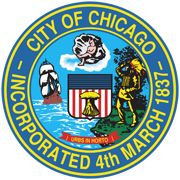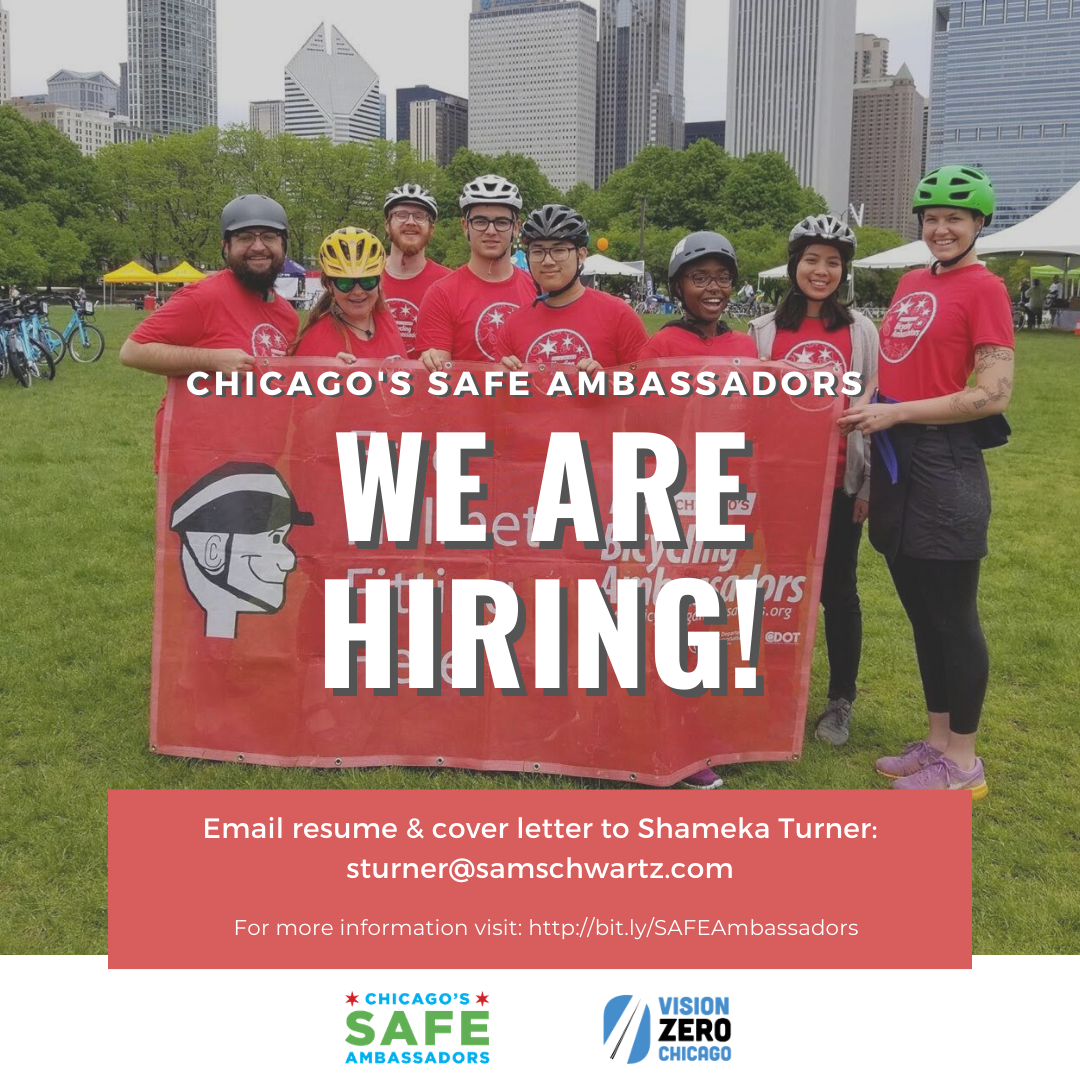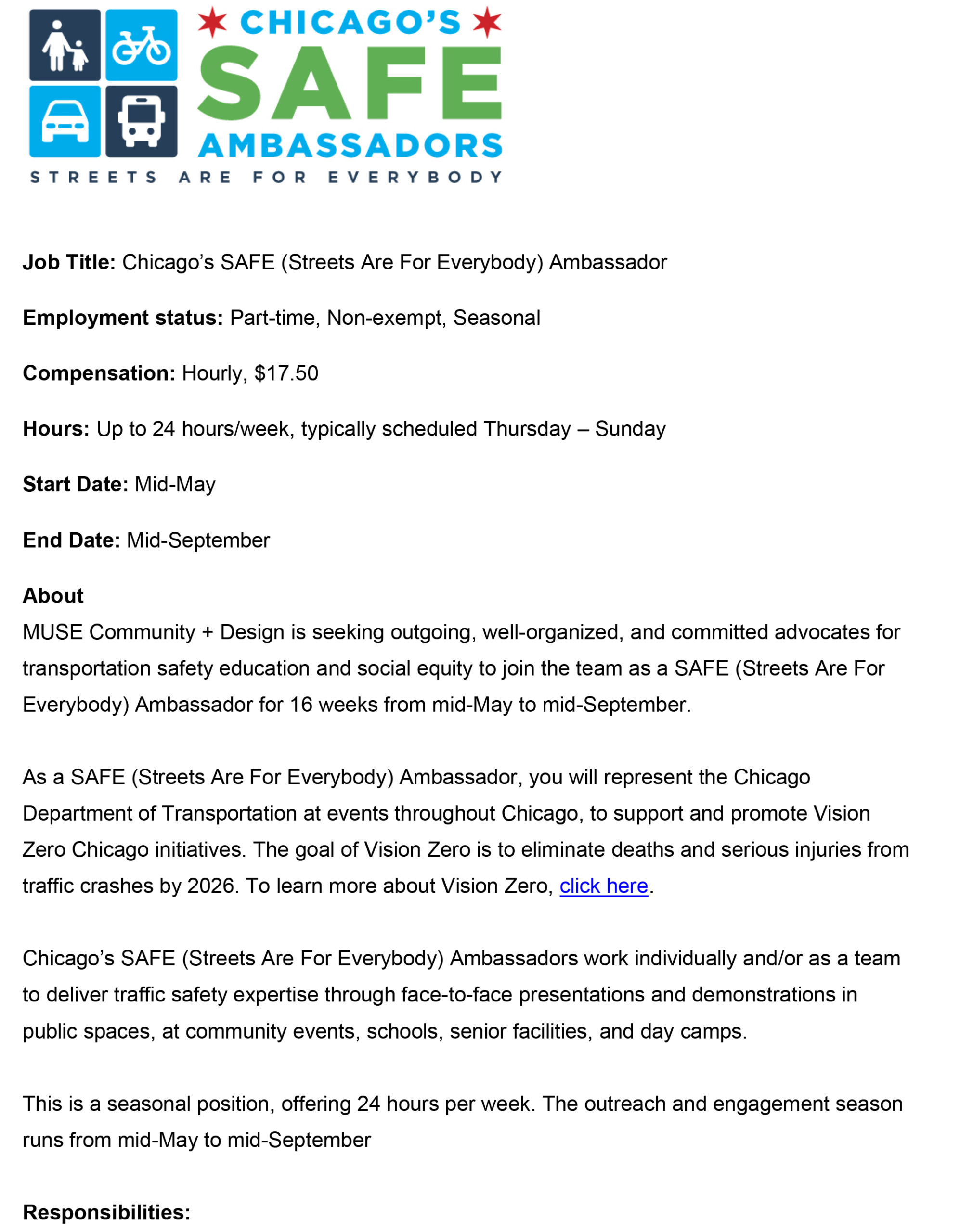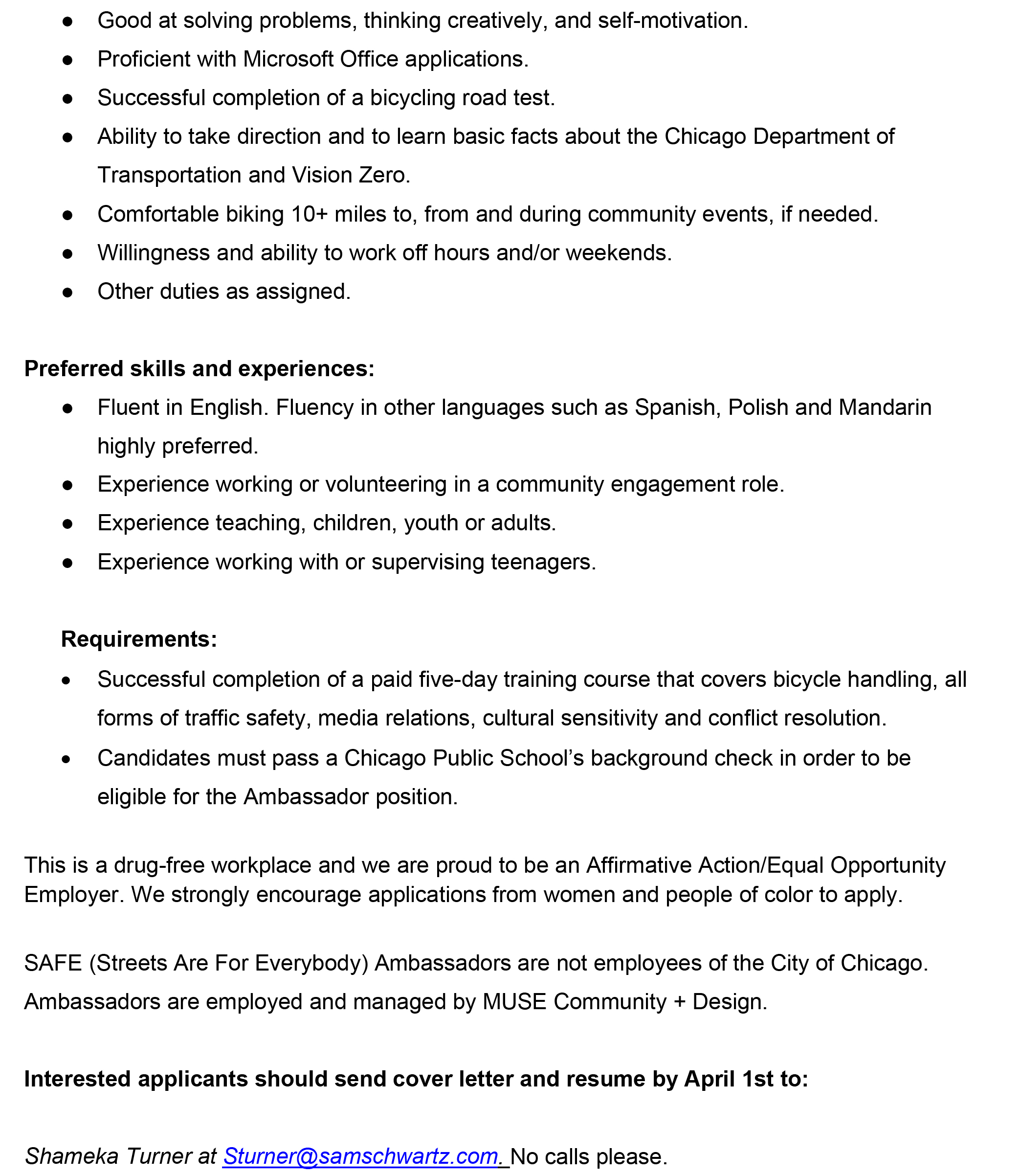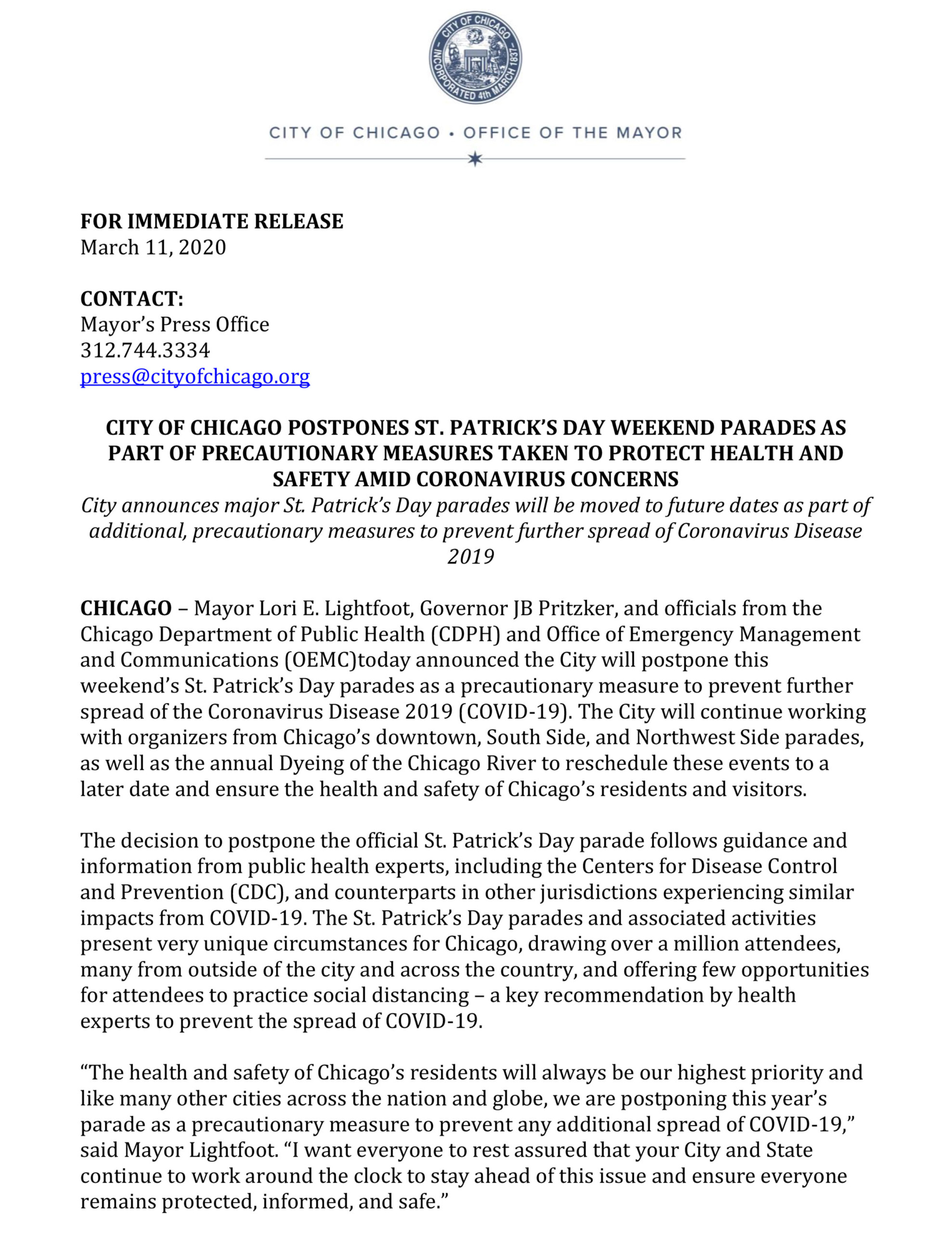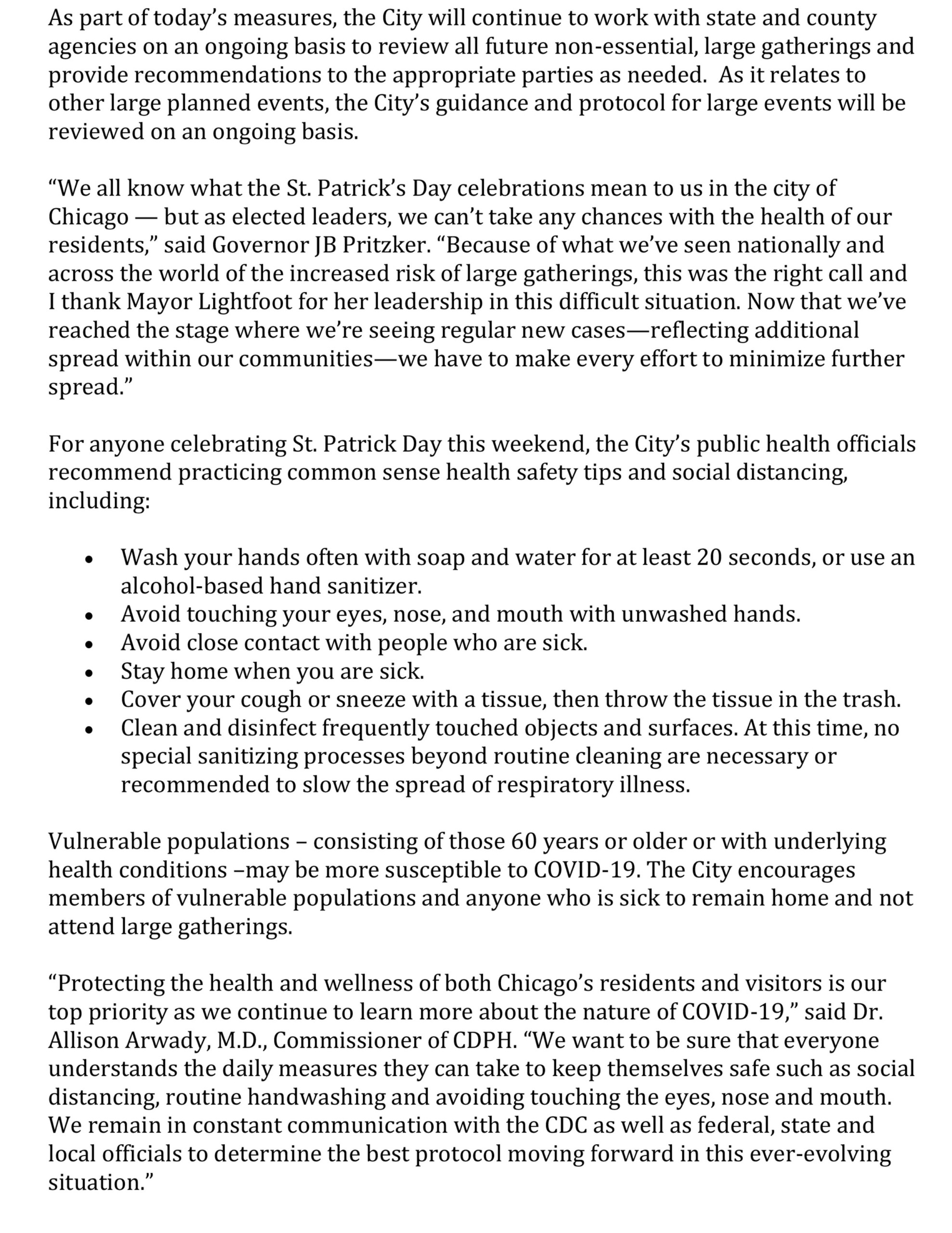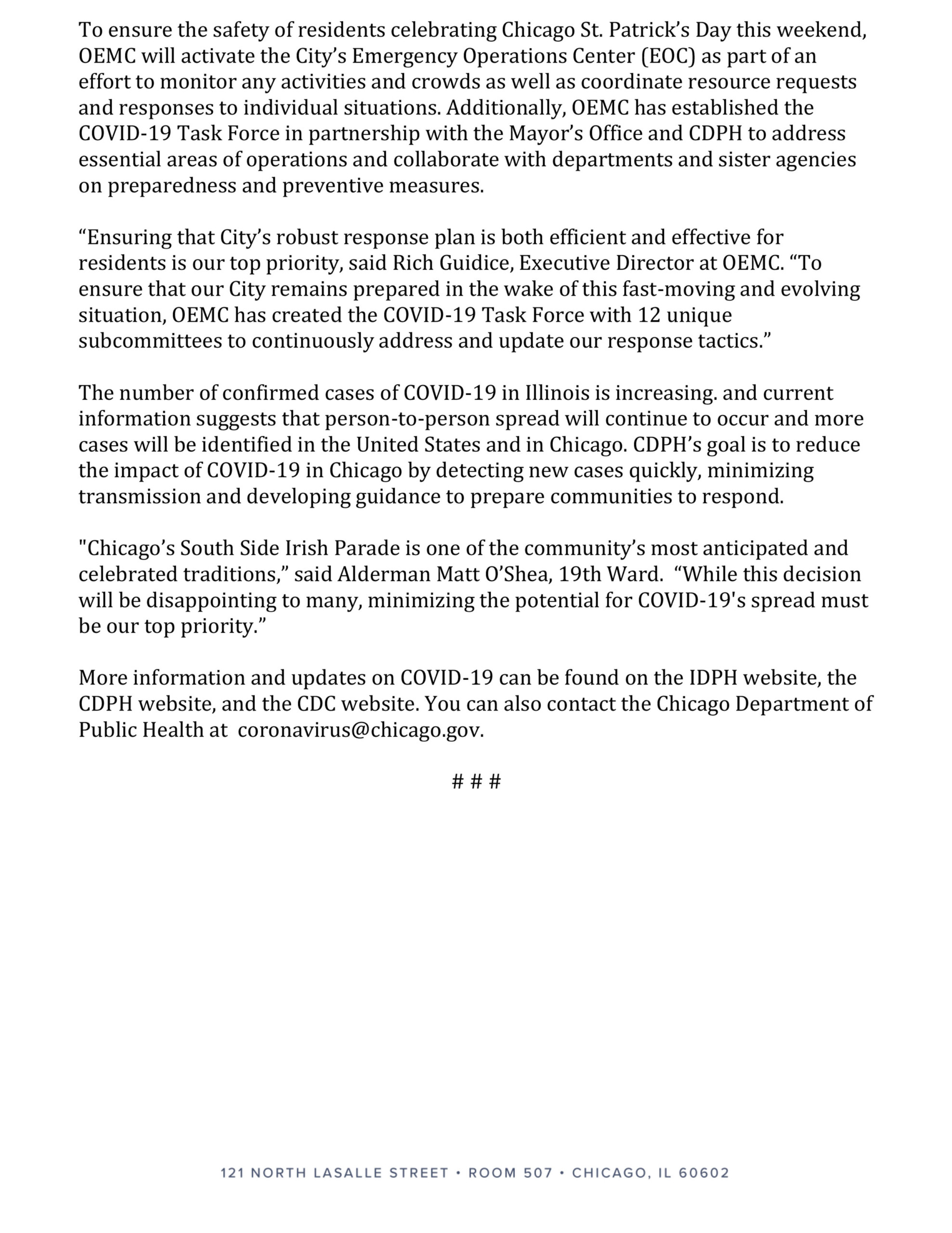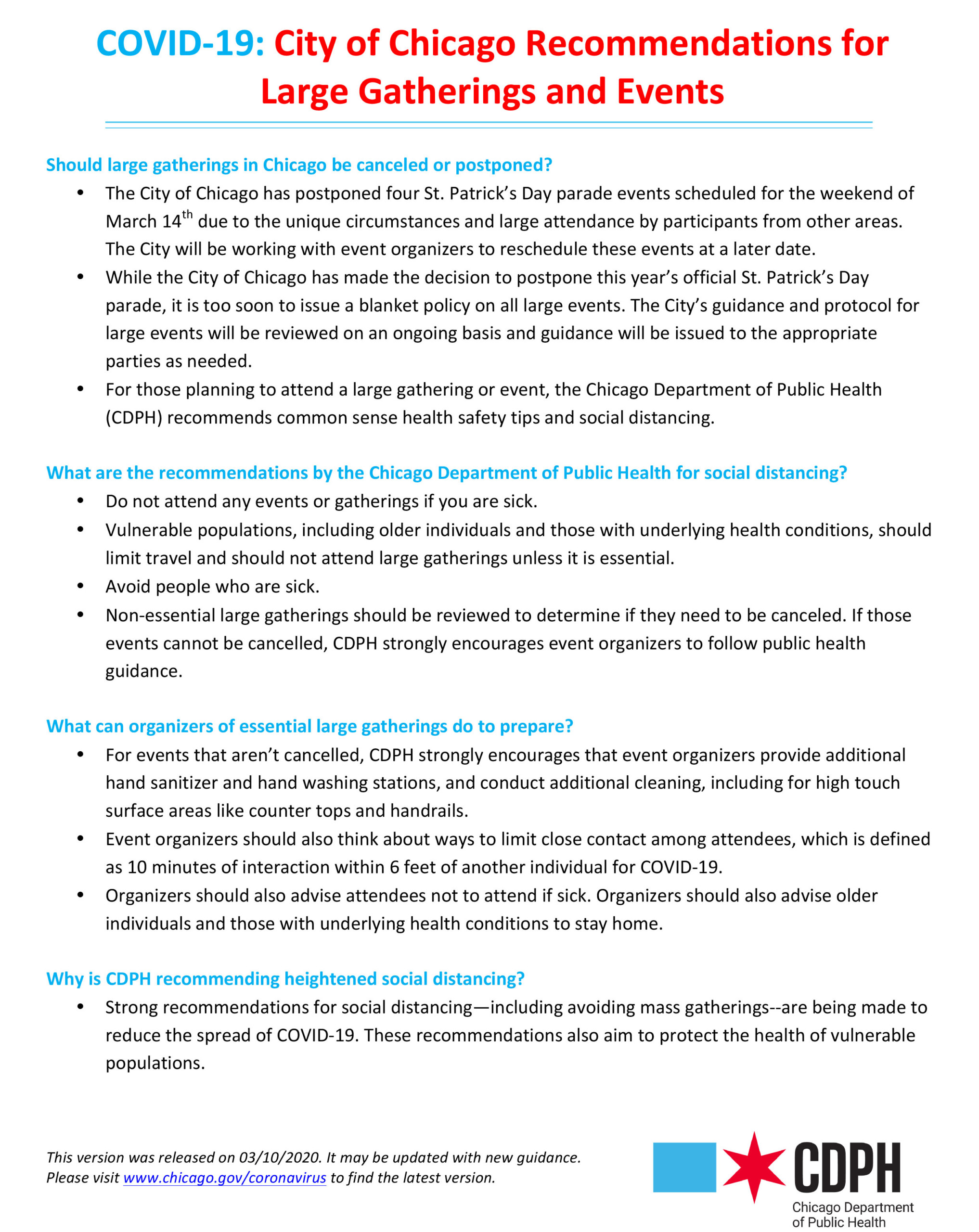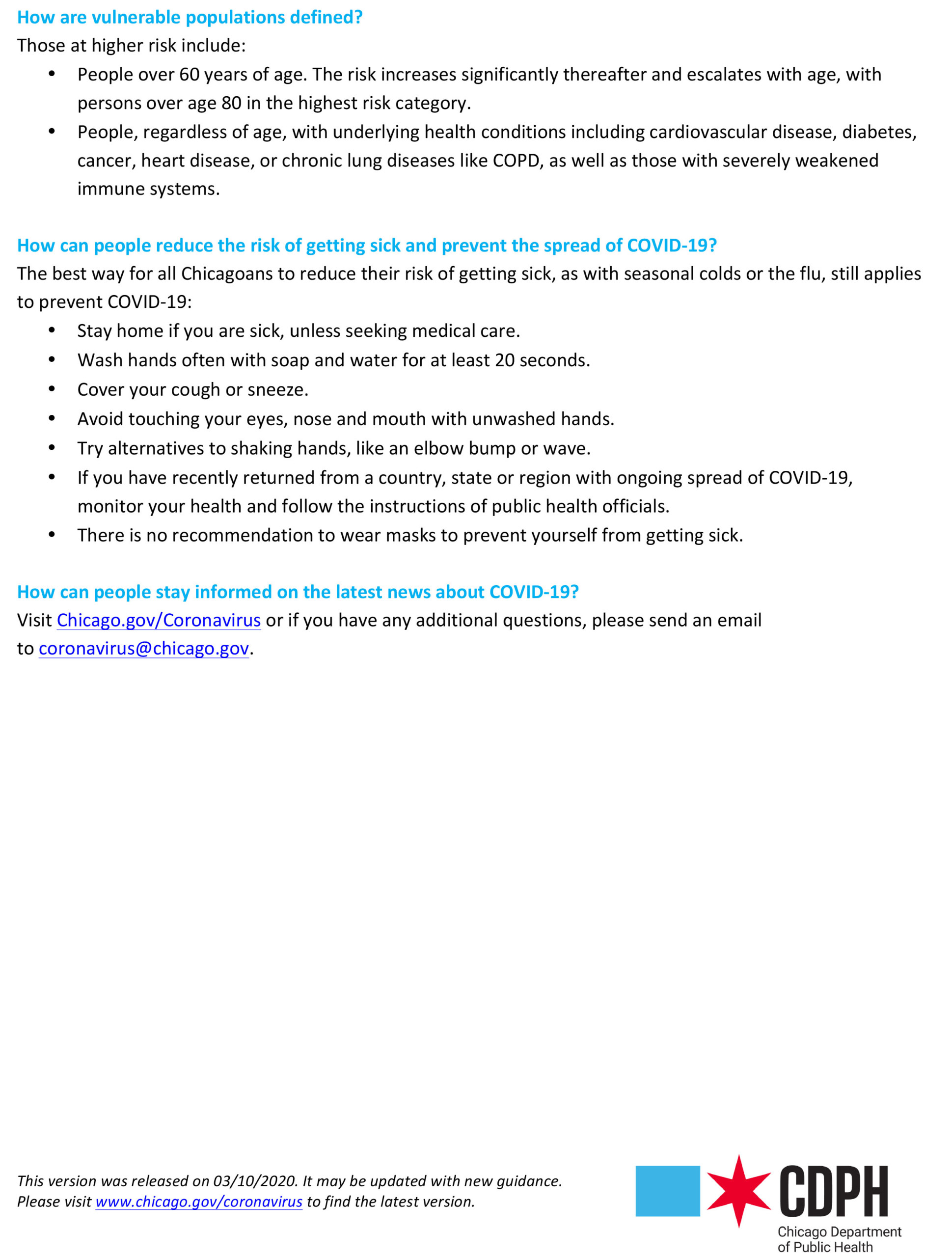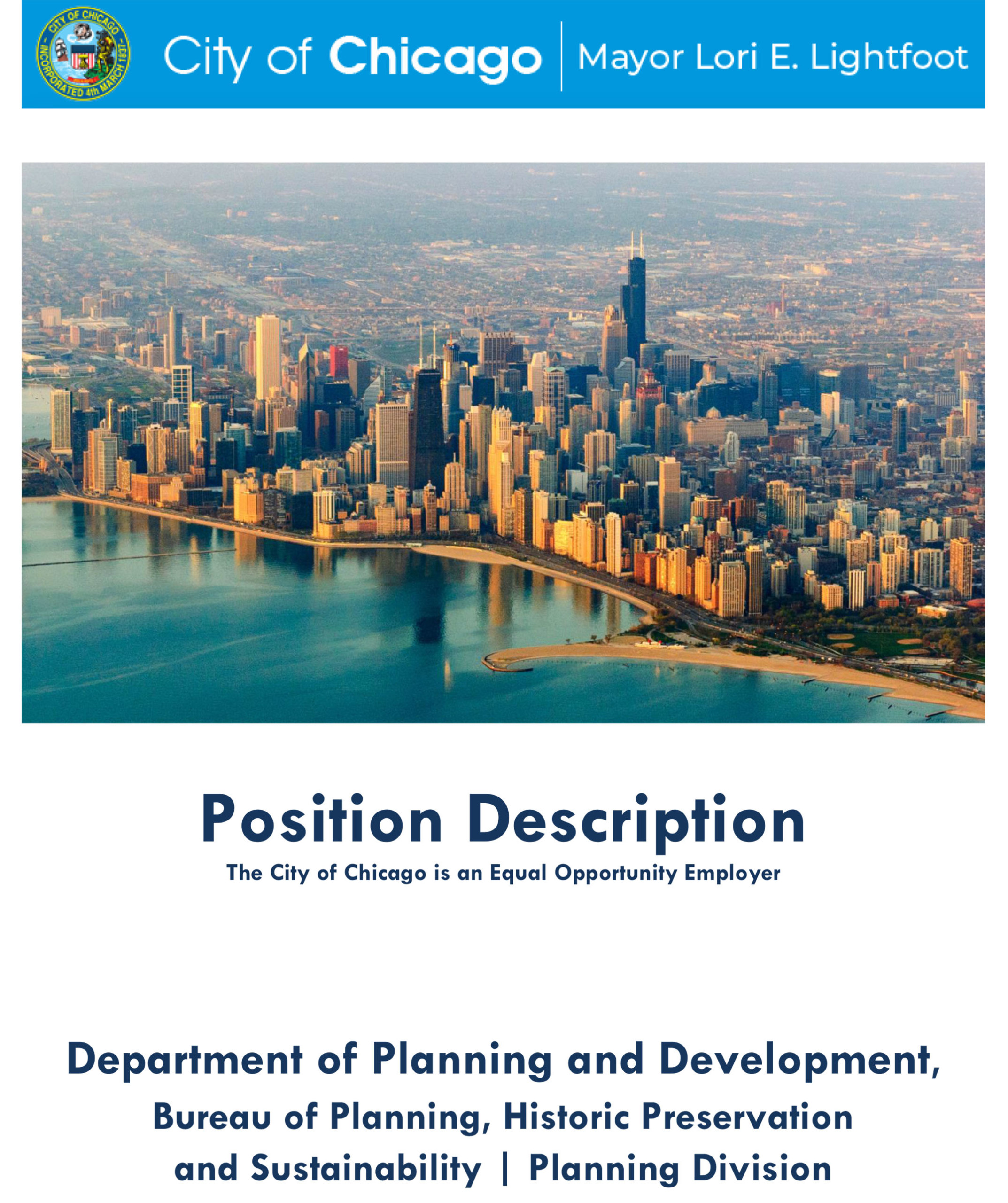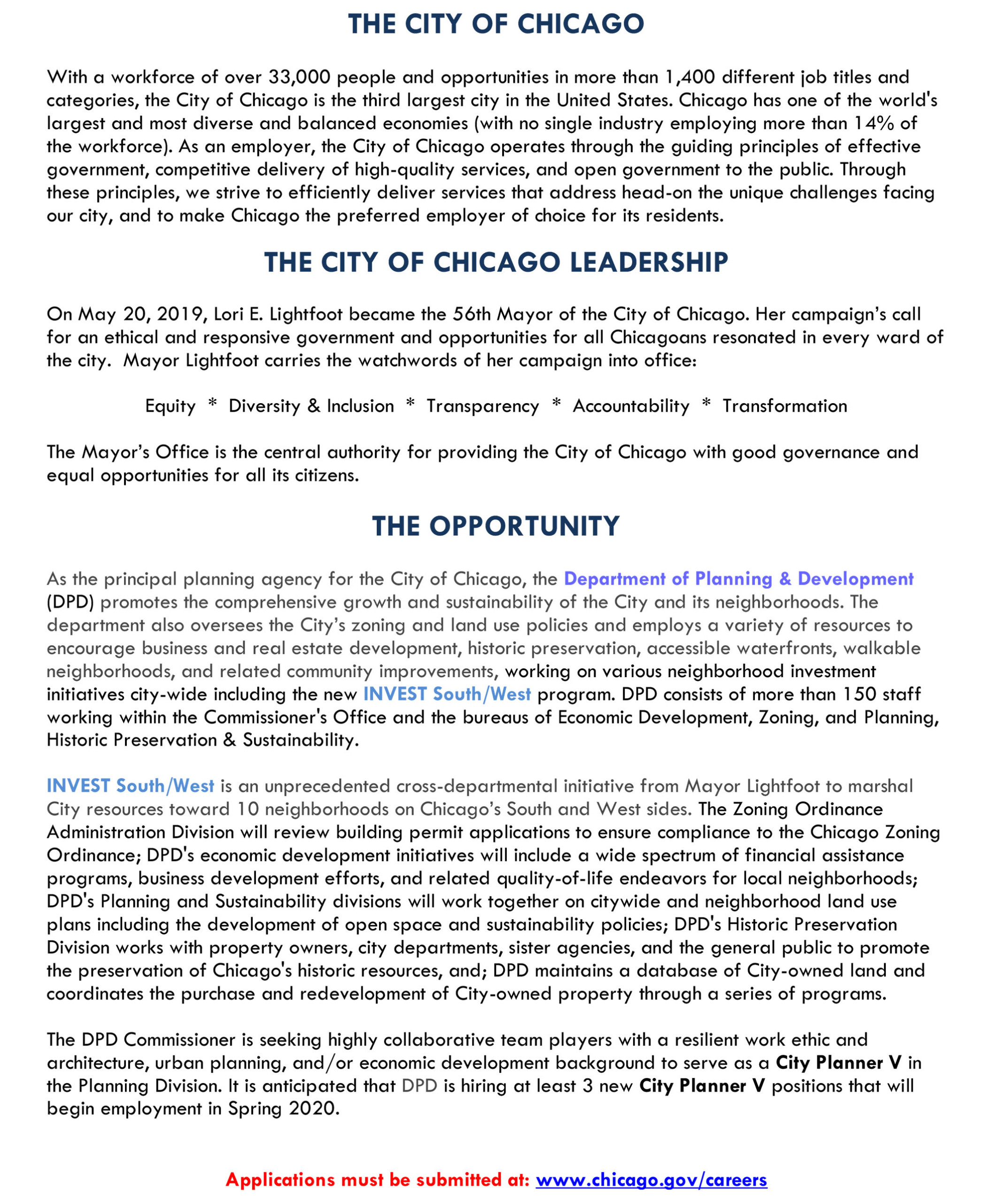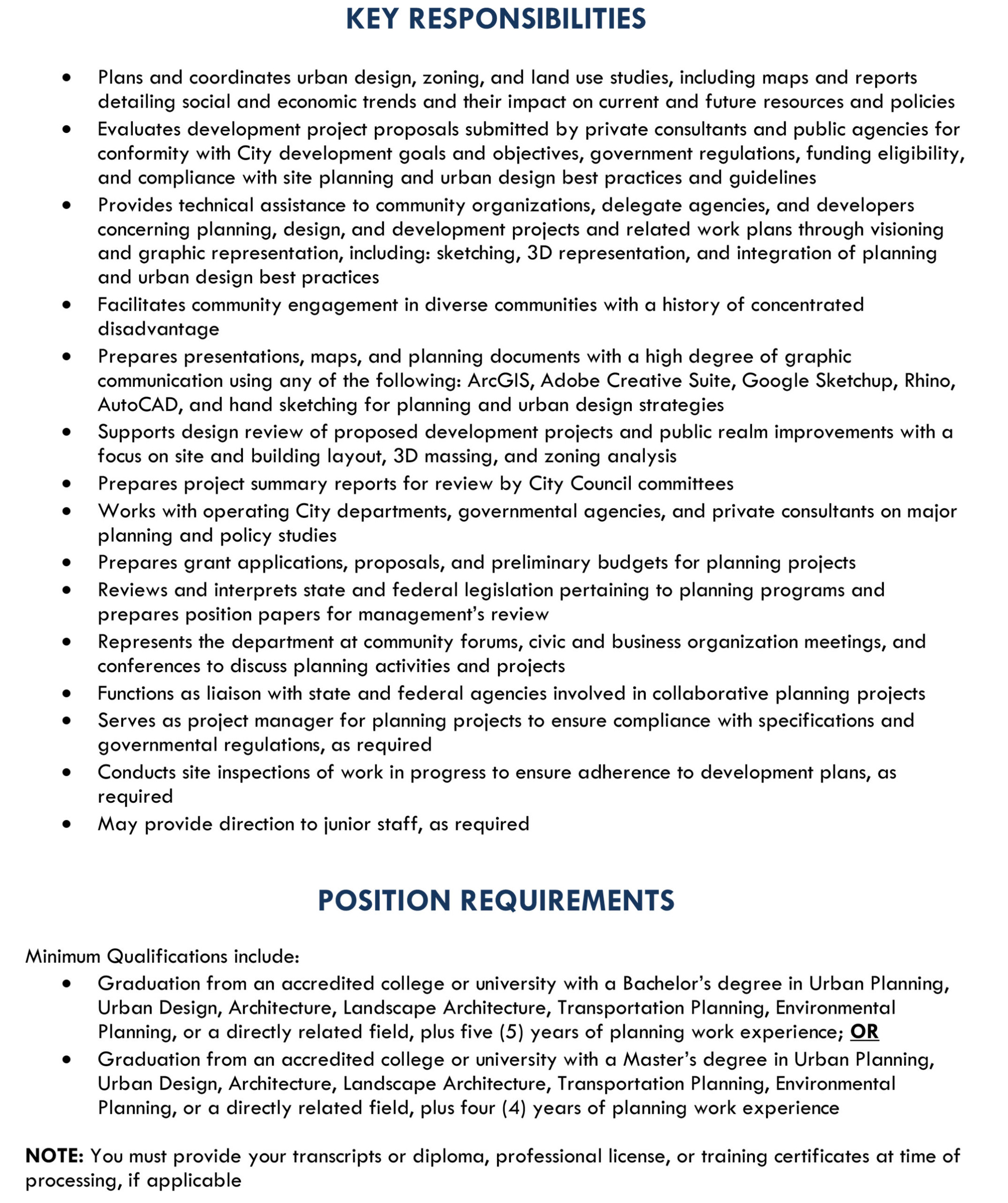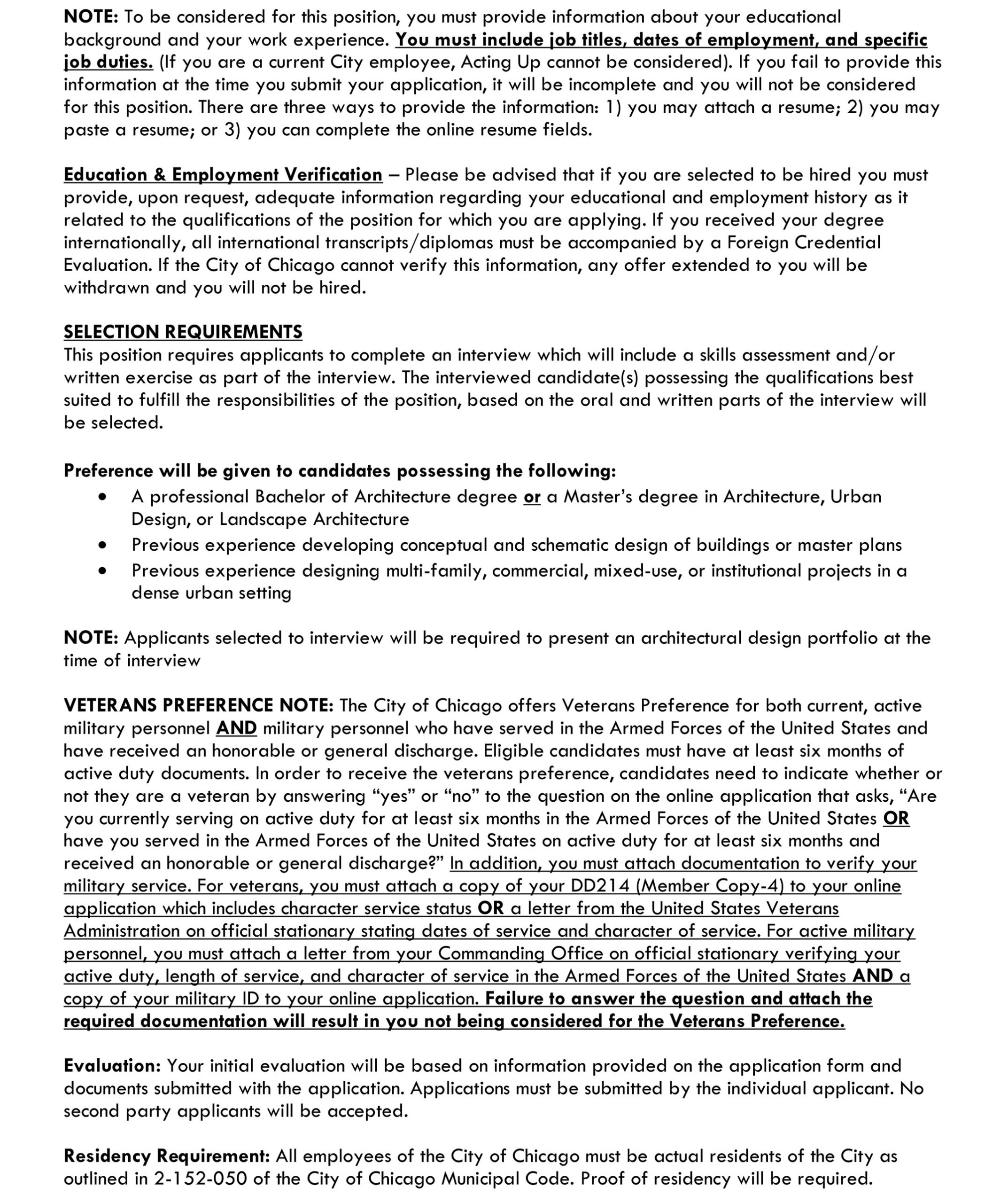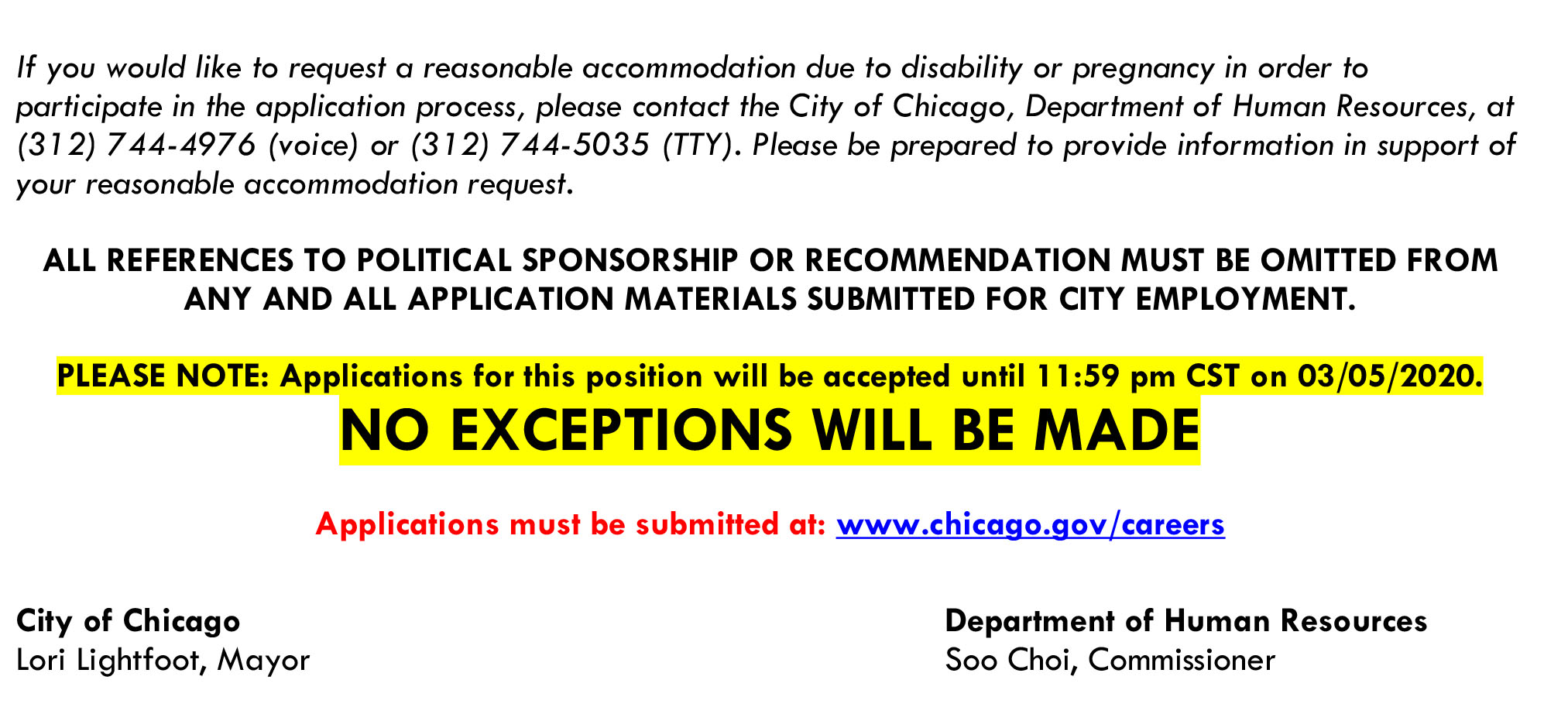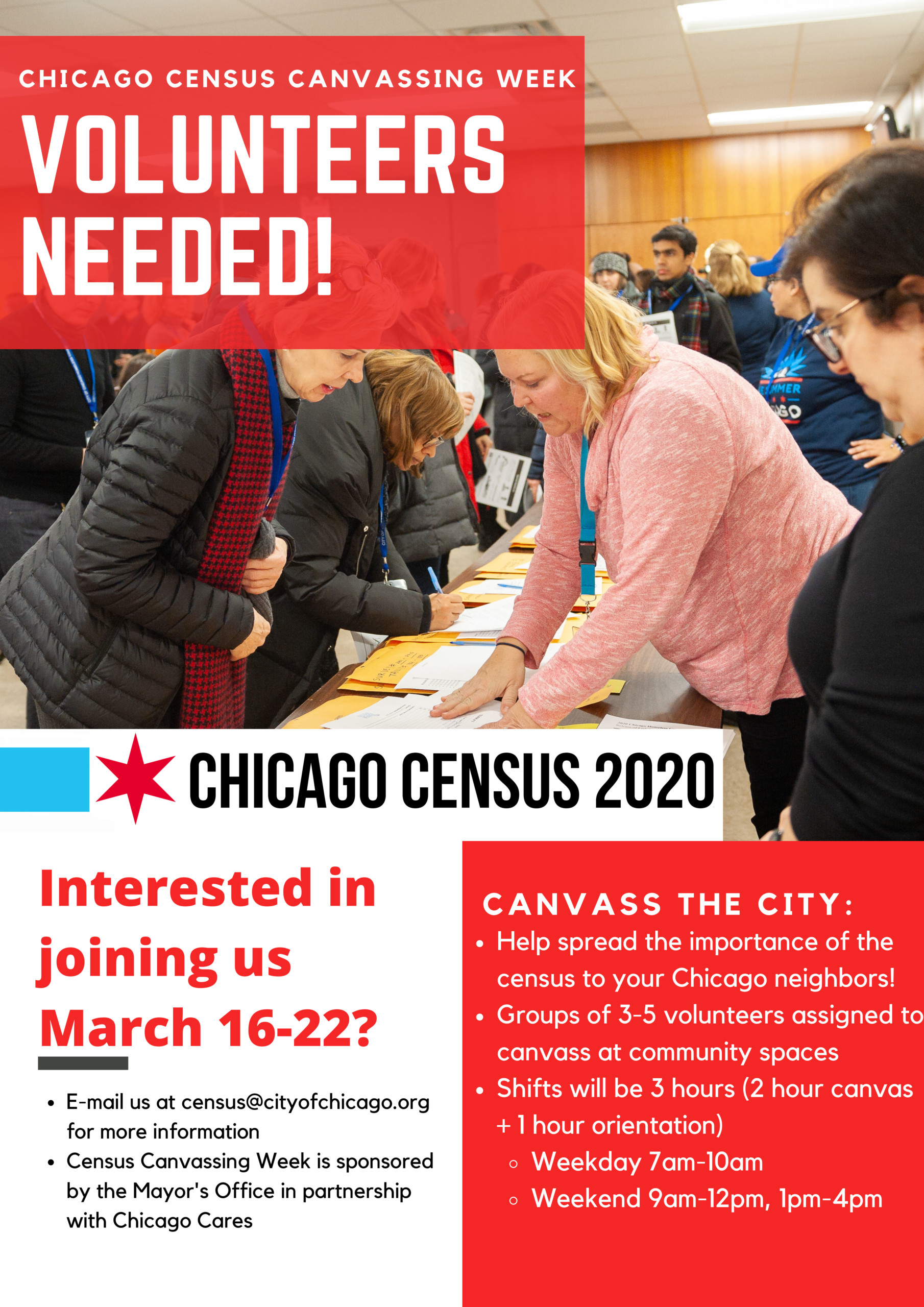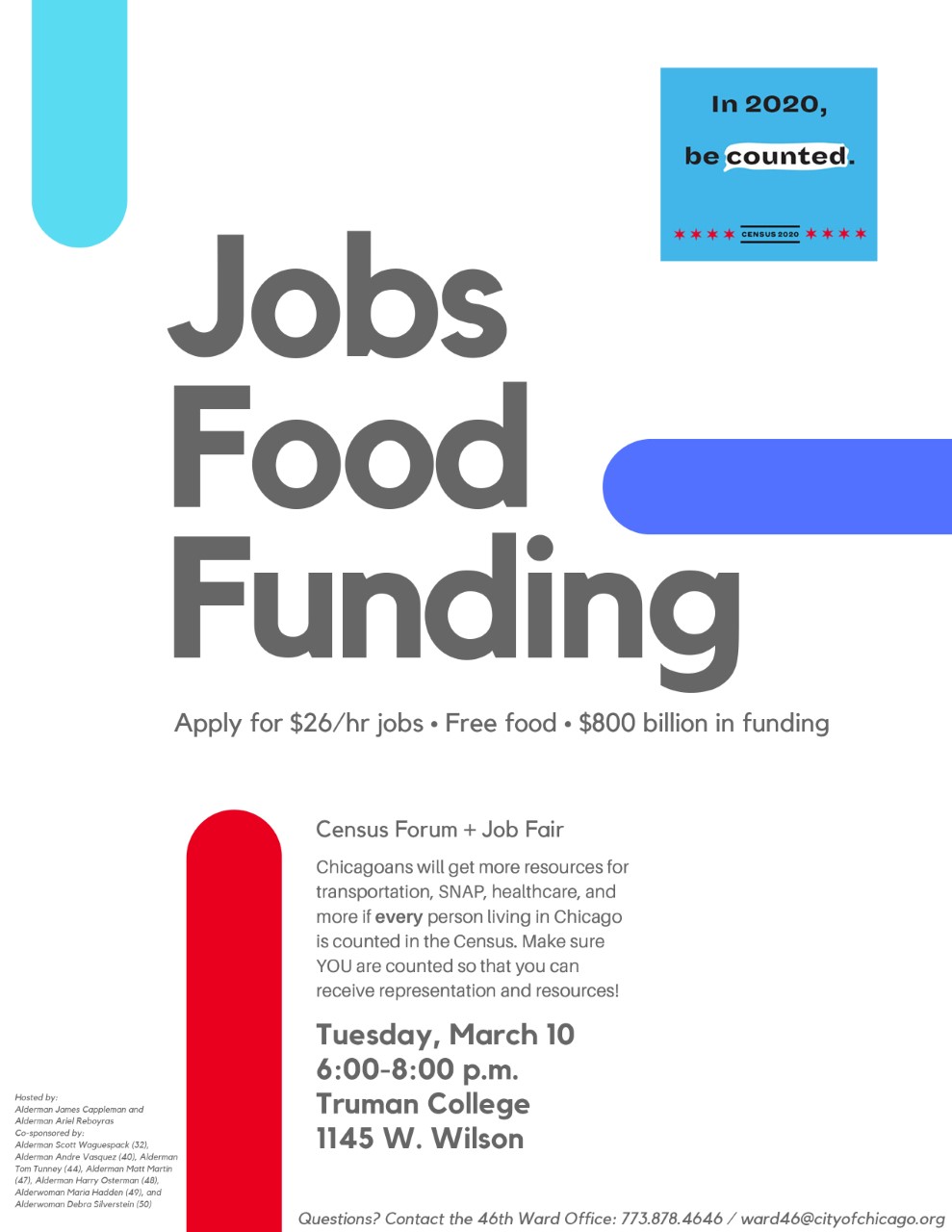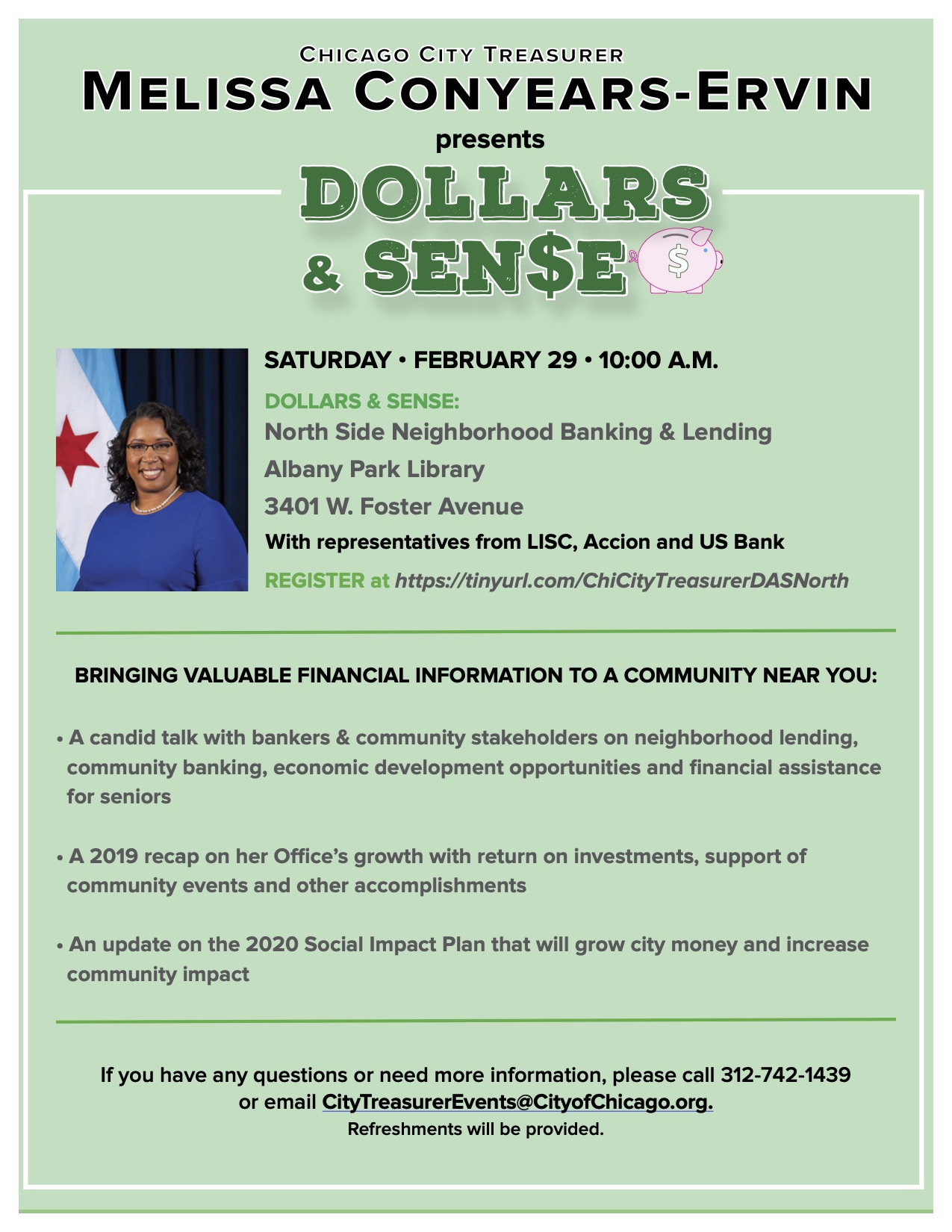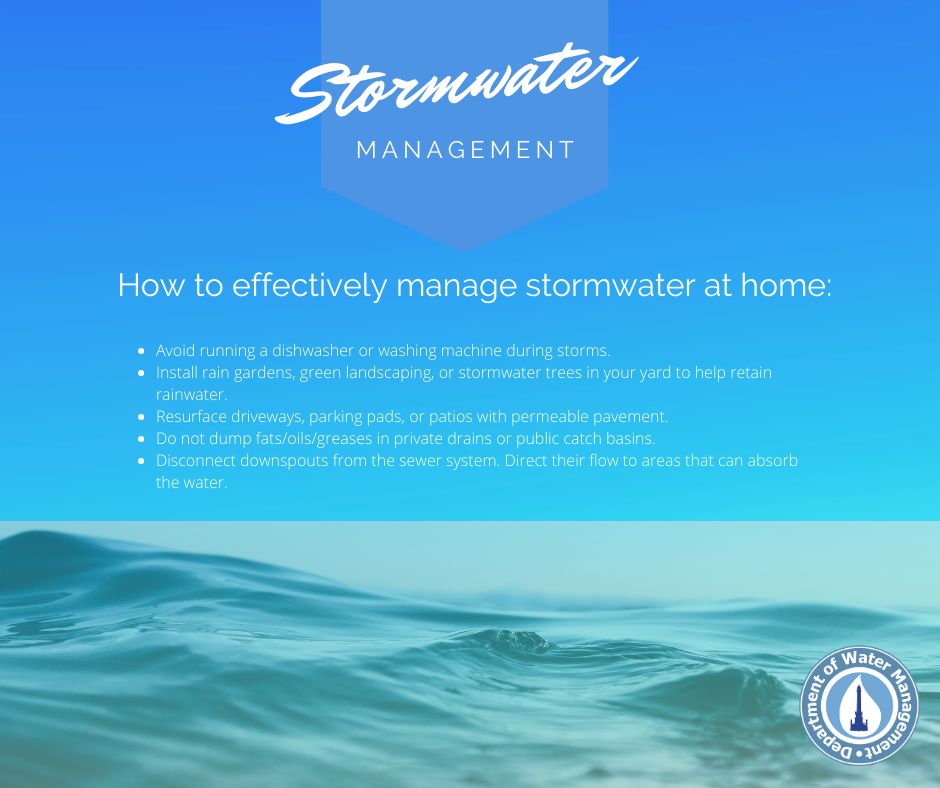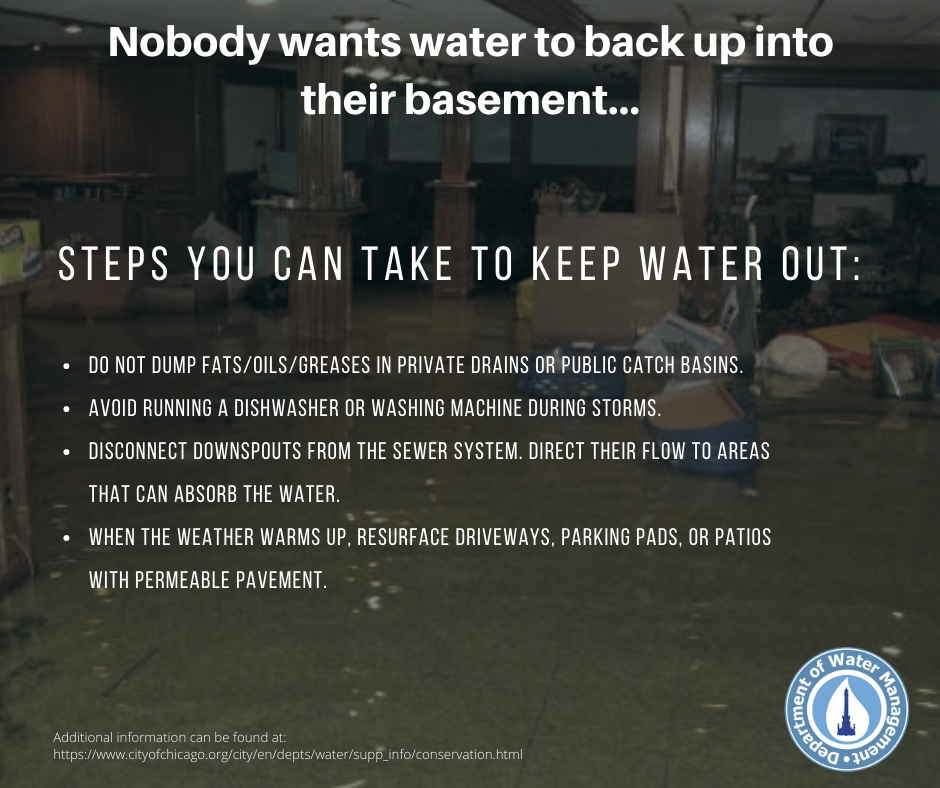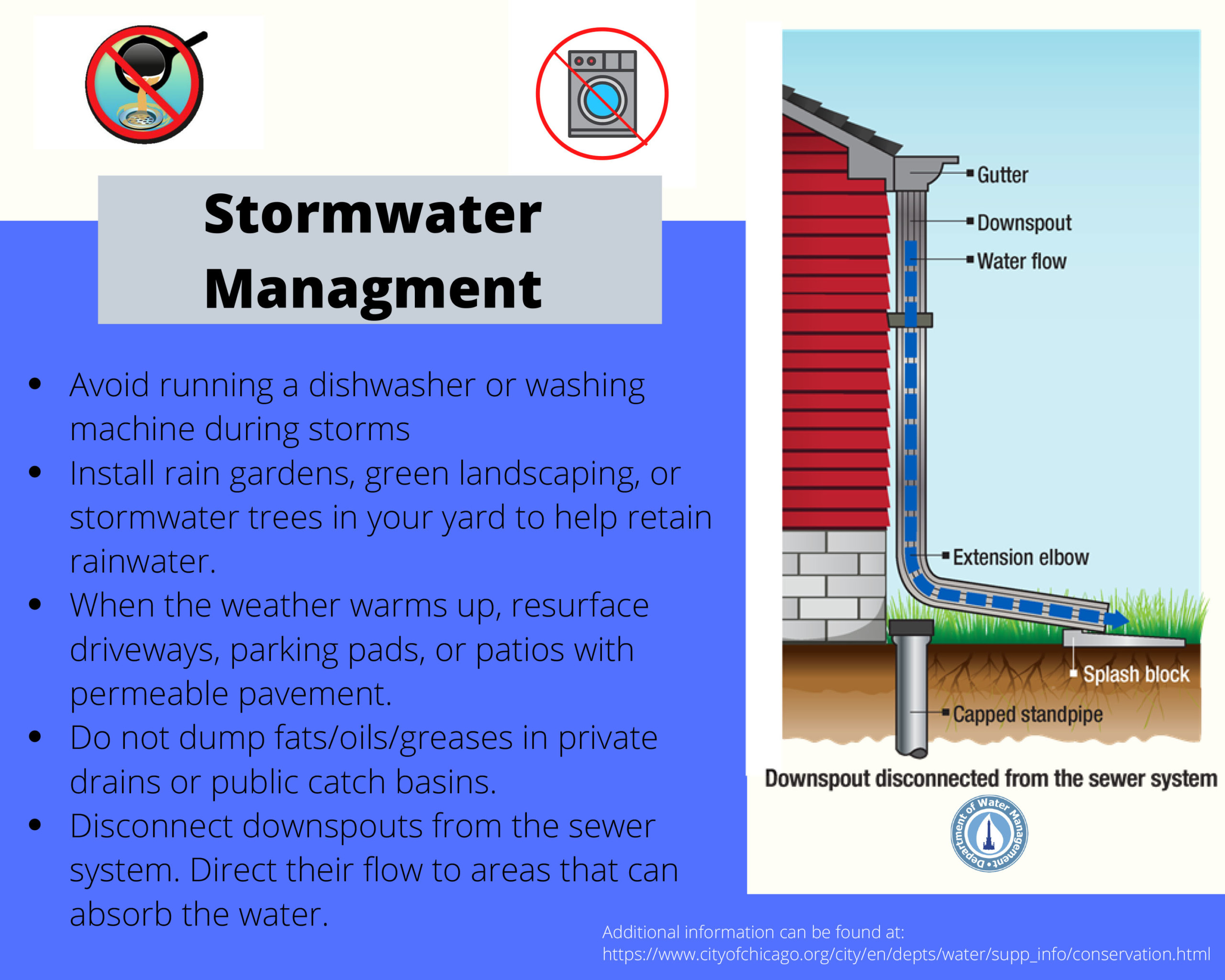Articles under City of Chicago Notice
CITY OF CHICAGO POSTPONES ST. PATRICK’S DAY WEEKEND PARADES
City of Chicago Recommendations for Large Gatherings and Events
DPD Job Posting
Volunteers Needed for Chicago Census Canvassing Week!
Senior Citizen Sewer Rebate 2020
As of January 2020, all Senior Sewer Rebates will be handled by the Department of Finance, Utility Billing & Customer Service.
The application for both Seniors Citizen Sewer Rebate for Condominiums and Townhomes ($50 Rebate) and Single Family Homes (Exemption of the Sewer Charge) have been combined into one application.
Renewal notices for the Senior Citizen Sewer ($50 Rebate) have been sent to 2019 applicants and should arrive by mail shortly. Renewal applications require the following documents:
1. Proof of age: copy of applicant’s birth certificate/government issued identification with date of birth (For example: driver’s license, passport, Chicago Citykey)
2. Proof of ownership: copy of deed, property tax bill, or co-op certificate in the applicant’s name
3. Proof of residence: copy of utility bill or property tax bill in the applicant’s name
New residents or those now eligible to receive a rebate or sewer exemption can download the application and instructions here: https://www.chicago.gov/city/en/depts/fin/provdrs/utility_billing/svcs/apply-for-utility-charge-exemptions.html
Please submit all applications and supporting documentation directly to the Department of Finance:
City of Chicago, Department of Finance P.O. Box 6330 Chicago, Illinois 60680-6330 Or e-mail to: utilitybill@cityofchicago.org
If you have any questions, you may contact the Utility Billing & Customer Service office at 312-744-4426 or call our office at 773-525-6034.
Coronavirus Disease 2019 (COVID-19)
Coronavirus Disease 2019 (COVID-19)
COVID-19 Update
(last updated February 24, 2020)
COVID-19 is spreading from person to person in China, and limited spread among close contacts has been detected in some countries outside China, including the United States. At this time, however, this virus is NOT spreading in communities in the U.S. and the health risk to the general public remains low both in the U.S. and in Chicago.
There have been two confirmed cases of Coronavirus Disease 2019 (COVID-19) in the Chicago area: The first case was announced on January 24, 2020, in a person who had traveled to Wuhan, China; The second case was announced on January 30, 2020, in a close household contact.
The goal of the ongoing U.S. public health response is to detect new cases quickly and prevent community spread of COVID-19. The coming days and weeks are likely to bring more confirmed cases of COVID-19 in the U.S. and globally, but strong public health measures now may blunt the impact of the virus. CDPH is monitoring the situation carefully and will rapidly communicate any changes in this guidance.
While the immediate risk of this new virus to the American public is believed to be low at this time, everyone can do their part to help us respond to this emerging public health threat:
- It’s currently flu and respiratory disease season and CDC recommends getting a flu vaccine, taking everyday preventive actions to help stop the spread of germs, and taking flu antivirals if prescribed.
- If you are a healthcare provider, be on the look-out for people who recently traveled from China with fever and respiratory symptoms. Report suspect COVID-19 cases immediately (within 3 hours) to CDPH by calling 312-746-SICK (7425) Monday through Friday during business hours or 311 during evenings, weekends, and holidays. For more information, see Interim Guidance for Healthcare Professionals.
- If you are a healthcare provider caring for a COVID-19 patient, please take care of yourself and follow recommended infection control procedures.
- For people who are ill with COVID-19, please follow CDC guidance on how to reduce the risk of spreading your illness to others.
- For people who have had close contact with someone infected with COVID-19 who develop symptoms, contact your healthcare provider, and tell them about your symptoms and your exposure to a COVID-19 patient.
If you have been in China or have been exposed to someone sick with COVID-19 in the last 14 days, you will face some limitations on your movement and activity. Please follow instructions during this time. Your cooperation is integral to the ongoing public health response to try to slow spread of this virus. If you develop COVID-19 symptoms, contact your healthcare provider, and tell them about your symptoms and your travel or exposure to a COVID-19 patient.
Frequently Asked Questions
What is Coronavirus Disease 2019 (COVID-19)?
Coronavirus disease 2019 (COVID-19) is a respiratory illness that can spread from person to person. The virus that causes COVID-19 is a novel coronavirus named severe acute respiratory syndrome coronavirus 2 (SARS-CoV-2). It was first identified during an investigation into an outbreak in Wuhan, China. Coronaviruses are a large family of viruses that are common in many different species of animals, including camels, cattle, cats, and bats. Rarely, animal coronaviruses can infect people and then spread between people such as with MERS-CoV, SARS-CoV, and now with SARS-CoV-2.
Chinese health officials have reported tens of thousands of cases of COVID-19, with the virus reportedly spreading from person-to-person in parts of China. COVID-19 illnesses, most of them associated with travel from Wuhan, also are being reported in a growing number of international locations, including the U.S. Person-to-person spread of COVID-19 also has been seen among close contacts of returned travelers from Wuhan. The latest situation summary updates, including the number of cases identified in the U.S., are available on CDC’s web page Coronavirus Disease 2019 (COVID-19).
What are the symptoms?
Patients who get sick with COVID-19 develop mild to severe respiratory illness with symptoms of:
- fever
- cough
- difficulty breathing
Many common illnesses can cause these same symptoms. COVID-19 can only be diagnosed at a public health laboratory. Individuals who have these symptoms and have traveled to China or have had close contact with someone with COVID-19 should be seen by a doctor or medical professional.
CDC believes at this time that symptoms of COVID-19 may appear in as few as 2 days or as long as 14 days after exposure.
How does it spread?
Although the virus that causes COVID-19 probably emerged from an animal source, it is thought to spread mainly from person-to-person via respiratory droplets produced when an infected person coughs or sneezes. People are thought to be most contagious when they are most symptomatic (the sickest). How easily a virus spreads from person-to-person can vary. Some viruses are highly contagious (like measles), while other viruses are less so. Another factor is whether the spread is sustained. The virus that causes COVID-19 seems to be spreading easily and sustainably in Hubei province and other parts of China. In the U.S., spread from person-to-person has occurred only among a few close contacts and has not spread any further to date.
How is it treated?
There is no specific medicine to treat COVID-19 infection at this time, though studies are underway. People sick with COVID-19 should receive supportive care from a health care professional. Supportive care means care to help relieve symptoms; for example, medicine to bring down fevers, or oxygen if a patient’s oxygen level is low.
How is COVID-19 diagnosed?
Diagnosis occurs through laboratory testing of respiratory specimens and serum (blood). Some coronavirus strains cause the common cold and patients tested by their health care provider may test positive for these types. The COVID-19 strain can only be detected at a public health laboratory.
How can I protect myself and my family?
As with any respiratory virus, you can protect yourself and others by taking everyday common sense actions:
- Wash your hands often with soap and water for at least 20 seconds. If soap and water are not available, use an alcohol-based hand sanitizer.
- Avoid touching your eyes, nose, and mouth with unwashed hands.
- Avoid close contact with people who are sick.
- Stay home when you are sick.
- Cover your cough or sneeze with a tissue, then throw the tissue in the trash.
- Clean and disinfect frequently touched objects and surfaces.
Remember that it is also flu season and CDPH recommends getting vaccinated, taking everyday preventive actions to stop the spread of germs, and taking flu antivirals if prescribed. For more information, see www.chicago.gov/flu.
Do I need to wear a mask?
CDPH does not recommend that people who are well wear a face mask to protect themselves from respiratory diseases, including COVID-19. Face masks should be used by people who show symptoms of COVID-19 to help prevent the spread of the disease to others. The use of facemasks is also crucial for health workers and people who are taking care of someone in close settings (at home or in a health care facility).
What can travelers do to protect themselves and others?
CDPH recommends avoiding travel to China. Chinese officials have closed transport within and out of Wuhan and other areas in Hubei Province, including buses, subways, trains, and the international airport. Additional restrictions and cancellations of events may occur. For travel advice for other countries, please visit that country’s Destination Page or CDC’s Travel Health Notice website.
What if I recently traveled to China?
If you have been in China or have been exposed to someone sick with COVID-19 in the last 14 days, you will face some limitations on your movement and activity. Please follow instructions during this time. Your cooperation is integral to the ongoing public health response to try to slow spread of this virus.
- Your health will be screened for COVID-19 symptoms. Travelers who have fever, cough, or trouble breathing will be taken to a medical facility for further evaluation and care.
- Travelers who have been in Hubei Province in the past 14 days and do not have symptoms will be placed under a quarantine order.
- Travelers from other parts of China (outside Hubei Province) who do not have symptoms should stay home and monitor their health. If you develop COVID-19 symptoms, call CDPH. If you can’t reach CDPH, call ahead before going to a doctor’s office or emergency room. Tell them your symptoms and that you were in China.
What are the recommendations for healthcare providers?
If you are a healthcare provider, be on the look-out for people who recently traveled from China and have fever and respiratory symptoms. Report suspect COVID-19 cases to CDPH immediately (within 3 hours) by calling 312-746-SICK (7425) Monday through Friday during business hours or 311 during evenings, weekends, and holidays.
If you are a healthcare provider caring for a COVID-19 patient or a public health responder, please take care of yourself and follow recommended infection control procedures. For more information, see Interim Guidance for Healthcare Professionals.
If you have any additional questions, please email us at coronavirus@chicago.gov or call 312-746-4835.
Other Available Resources
Print Resources:
- Get the Facts: Coronavirus Disease 2019 (COVID-19)
- What you need to know about COVID-19 (English, Spanish, Simplified Chinese)
- What to do if you are sick with COVID-19 (English, Spanish, Simplified Chinese)
- Stop the Spread of Germs Poster (English, Spanish, pdf iconSimplified Chinese)pdf ico
Information for Specific Groups:
- Travelers
- Pregnant Women and Children
- Healthcare Professionals
- Businesses and Employers
- Students
- K-12 Schools
- Universities
- Organizations
Press releases:
- February 15, 2020: Public Health Officials Announce Two Chicago Patients Released From Home Isolation Per CDC Guidance
- February 13, 2020: Public Health Officials Report Local Progress in Containing Novel Coronavirus
- February 11, 2020: Illinois First State to Test for Novel Coronavirus
- January 30, 2020: Second Illinois 2019 Novel Coronavirus Case Identified (English, Chinese)
- January 24, 2020: City of Chicago Announces First Local Patient with Travel-Related Case of 2019 Novel Coronavirus (English, Chinese)
- January 21, 2020: Federal Authorities have added O’Hare International Airport to a Coronavirus Screening Program for Travelers from Wuhan, China
Census Forum + Job Fair
Every 10 years, the federal government conducts a headcount of every person living in the country as part of the U.S. Census.
The number of people counted in the Census determines how more than $800 billion in transportation, education, healthcare, housing, and other resources is distributed to states and local communities. Funding for SNAP. Illinois representatives. School lunches. Plans for highways. Census results will affect you and our community every day!
This is why it is critical that everyone is counted in the 2020 census. This includes children, green card holders, and hard-to-reach populations. The Census is also a great short-term job opportunity.
I am pleased to co-sponsor the 2020 Census Forum so that 44th ward and other Northside residents can learn more about the 2020 census and how to apply for Census jobs.
The forum will take place on Tuesday, March 10 from 6:00 – 8:00 pm at the Truman College McKeon Lobby, 1145 W. Wilson Ave. Enjoy refreshments from local restaurants while you learn about the importance of the 2020 Census and how you can help to ensure that everyone is counted.
Supporting Documents/Information
Chicago Treasurer Dollars & Sense Event
Managing Stormwater at Home
Climate Change and Stormwater
There have been lots of stories this winter about the rising levels in Lake Michigan, the erosion of many of the city’s beaches and flooding along the lakeshore. As we see warmer winters and more intense storms, the Chicago Department of Water Management would like to remind you that there are simple steps you can take to help keep water out of our basement.
- Do not dump fats/oils/greases in private drains or public catch basins.
- Avoid running a dishwasher or washing machine during storms.
- Disconnect downspout connections from the sewer system. Make sure to direct flow to areas with permeable surfaces that can properly absorb the stormwater or use rain barrels to collect the rain directly from the downspouts.
- Install rain gardens, green landscaping, or stormwater trees in your yard to help retain rainwater.
- Resurface driveways, parking pads, or patios with permeable pavement.
Additional information can be found at: https://www.cityofchicago.org/city/en/depts/water/supp_info/conservation.html
Supporting Documents/Information
